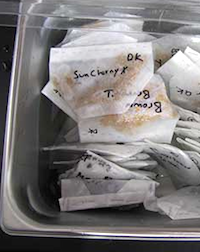Vegetable Integrated Crop Management Twilight Meeting
Date: Tuesday, April 22, 2014 7:00 p.m. – 9:00 p.m.
Location: East Vineland Fire Hall, Landis Ave. across from the Savoy Restaurant
(park behind the building and enter conference room door in rear)
The Rutgers Cooperative Extension Agricultural Agents of Atlantic, Cumberland and Gloucester Counties invite you to the first twilight meeting of the 2014 season to discuss early spring crop pest control, label updates and management topics. Feel free to bring plant, insect, disease, or weed samples to the meeting to have them identified, or perhaps you can stump the experts. Please bring samples in sealed plastic bags. [Read more…]

